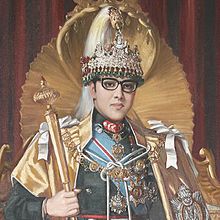Birendra Bir Bikram Shah Dev
| Birendra | |
|---|---|

Late King Birendra in traditional Nepali Royal Dress
|
|
| King of Nepal | |
| Reign | 31 January 1972 – 1 June 2001 |
| Coronation | 24 February 1975 |
| Predecessor | Mahendra |
| Successor | Dipendra |
| Born |
29 December 1944 Narayanhiti Royal Palace, Kathmandu, Nepal |
| Died | 1 June 2001 (aged 56) Narayanhiti Royal Palace, Kathmandu, Nepal |
| Consort | Aishwarya Rajya Laxmi Devi |
| Issue |
King Dipendra Princess Shruti Prince Nirajan |
| House | Shah |
| Father | King Mahendra Bir Bikram Shah Dev |
| Mother | Indra Rajya Laxmi Devi |
| Religion | Hindu |
| Signature | |
|
Styles of His Majesty King Birendra Bir Bikram Shah Dev |
|
|---|---|
 |
|
| Reference style | His Royal Majesty |
| Spoken style | Your Royal Majesty |
| Alternative style | Sir |
Birendra Bir Bikram Shah (Nepali: वीरेन्द्र वीर विक्रम शाह) (29 December 1944 – 1 June 2001) was the King of Nepal and a South Asian statesman. The eldest son of King Mahendra, whom he succeeded in 1972, he reigned until his death in the 2001 Nepalese royal massacre.
From a very young age, Birendra was described even by his school teachers as a very kind and emotional prince, and is frequently known to the people of Nepal as one of greatest kings, if not the greatest leading monarch the Nepali citizens ever had, unlike his brother, Gyanendra. King Birendra was described as one of the few Nepalese monarchs who wanted the Nepalese people to experience real democracy. This was observed in the 2036 B.S. Janmat Sangraha (1980 Referendum) when he wanted the people to choose whether they wanted 'Multiparty Democracy' or a 'Reformed Panchayat System'. Also, in People's Movement I, he decided to establish 'Constitutional Monarchy' in Nepal instead of fighting for dictatorship.
In 1989, when the People’s Movement I was taking momentum, as the condition of safeguarding the panchayat system, India had put forward some conditions to King Birendra aimed at taking control over national sovereignty. If the King had accepted these conditions, the panchayat system would not have ended. But the king said that, "It is better to surrender to the people rather than surrender to India.”
Some historians would speculate that King Birendra's democratic views and simple nature led to the success of the People's Movement I (1990). He is credited for introducing SAARC in Asia in order to strengthen the foreign relations of Nepal with the other South Asian countries.
...
Wikipedia
